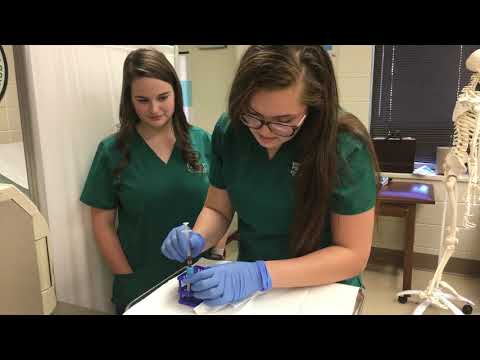What are the Duties of a Medical Clinical Assistant?
Contents
The duties of a medical clinical assistant are very important in helping to ensure the smooth running of a medical facility. They can include everything from administrative tasks to patient care.
Checkout this video:
Job Description
The duties of a medical clinical assistant are numerous and varied, but all revolve around providing support to doctors, nurses, and other medical staff in the delivery of patient care. Clinical assistants may be responsible for performing administrative tasks such as scheduling appointments and answering phones, or they may be involved in direct patient care activities such as taking vital signs or helping with examinations. No matter what their specific duties, clinical assistants play an important role in keeping medical facilities running smoothly and efficiently.
Duties and Responsibilities
A medical clinical assistant is a subordinate medical professional who supports the work of physicians and other medical staff. Clinical assistants typically have an associate degree or postsecondary certificate, although some may hold a bachelor’s degree. They perform both administrative and clinical tasks, such as taking patient histories and collecting lab specimens. Many clinical assistants also perform basic laboratory tests, give injections, take electrocardiograms (EKGs), change dressings, and provide patient education.
Most clinical assistant jobs require completion of an accredited clinical assistant program and certification by a professional organization, such as the National Healthcare Association or the American Association of Medical assistants Some states regulate clinical assistants, requiring them to complete a state-approved program and pass a state-issued exam. Clinical assistants typically work in physicians’ offices, hospitals, or clinics.
Skills and Qualifications
The skills and qualifications that are needed for a medical clinical assistant generally vary depending on the employer. However, most employers will require their medical clinical assistants to have at least a high school diploma or equivalent, although some may prefer candidates who have completed some college coursework or have an associate’s degree. In addition, most employers will require their medical clinical assistants to have CPR certification and to be able to pass a background check. Additionally, many employers will prefer candidates who have prior experience working in a medical setting.
Education and Training
A medical clinical assistant is a healthcare professional who provides direct patient care services under the supervision of a licensed healthcare provider. Clinical duties may vary depending on state law and facility policy, but generally include taking medical histories, recording vital signs, and performing basic lab tests. Many medical clinical assistants also have training in phlebotomy, electrocardiography, and other diagnostic procedures.
Most medical clinical assistants complete a postsecondary education program that typically lasts one to two years. These programs are available at community colleges, technical schools, and some four-year colleges. Some states require licensure or certification for medical clinical assistants; however, requirements vary by state.
Salary and Job Outlook
The median salary for a medical clinical assistant was $32,480 in 2017, according to the U.S. Bureau of Labor Statistics. The top 10 percent earned more than $43,790, while the bottom 10 percent made less than $24,550.
Job prospects for medical clinical assistants are expected to be good. The U.S. Bureau of Labor Statistics projects that employment of Medical Assistants will grow by 29 percent from 2017 to 2026, much faster than the average for all occupations.
Career Paths
Healthcare is one of the few fields that is constantly expanding and evolving, which means there are many opportunities for those with the right training. One of the most popular career paths in healthcare is that of a medical clinical assistant. But what exactly does this position entail?
A medical clinical assistant is a professional who works in a healthcare setting to provide direct patient care. This can include tasks such as taking patient medical histories, performing physical exams, and providing education on preventative care. In some cases, medical clinical assistants may also be responsible for conducting laboratory tests and administrative tasks such as scheduling appointments.
The duties of a medical clinical assistant will vary depending on the specific job role, but all positions will require excellent communication and customer service skills. Those who are interested in this career path should have a strong interest in health and medicine, as well as basic computer skills. Most importantly, medical clinical assistants must be able to work well under pressure and maintain a calm demeanor in fast-paced environments.
Certification
Medical clinical assistants (CCA) provide healthcare services under the supervision of a physician or registered nurse. They are often the first point of contact between a patient and a healthcare facility. A CCA’s duties vary depending on the size and type of medical facility they work in, but they typically include taking medical histories, recording vital signs, scheduling appointments and providing instruction to patients on proper medication usage and diet. In larger facilities, CCAs may also assist with laboratory tests and diagnostic procedures.
Most CCAs have at least a certificate from an accredited program, although some have an associate’s degree. Programs typically take one to two years to complete and cover topics such as Medical Terminology anatomy, physiology, pharmacology and patient care techniques. Many CCAs also complete on-the-job training, which can last up to six months. After completing their educational requirements and on-the-job training, CCAs must pass a certification exam to earn their credential.
Job Opportunities
Medical Clinical Assistants provide care for patients in various medical settings, including hospitals, clinics, and physician’s offices. Although their duties vary depending on the type of facility they work in, they typically perform administrative tasks, such as scheduling appointments and updating patient records. In some cases, they may also be responsible for taking patient vital signs and assisting with minor medical procedures. With experience, Medical Clinical Assistants may advance to positions with more responsibility, such as managing a team of assistants or working as a liaison between patients and physicians.
Pros and Cons
Medical clinical assistants are in charge of performing a broad range of administrative and clerical tasks in order to support the work of healthcare professionals. Although the job is important, it can be extremely challenging and demanding. In this article, we will discuss the pros and cons of being a medical clinical assistant.
Pros:
The job is stable and has good potential for growth.
Clinical assistants can work in a variety of settings, such as hospitals, clinics, and physicians’ offices.
The work hours are typically regular and there is little to no overtime required.
The job offers a good opportunity to learn about the healthcare field and to gain experience working with patients.
Cons:
The job is often fast-paced and stressful.
Clinical assistants are expected to have excellent organizational skills and to be able to handle multiple tasks simultaneously.
They must be able to keep confidential patient information private and must have excellent communication skills.
FAQs
There are a few different types of medical assistants but clinical medical assistants generally work in doctor’s offices and clinics. They may also work in hospitals, but their duties are usually limited to clerical tasks. Clinical medical assistants interact with patients, so they need to have strong people skills. They also need to be able to handle a variety of tasks simultaneously and be detail oriented.
Some of the duties of a clinical medical assistant include scheduling appointments, taking patient histories and vital signs, preparing patients for examination, assisting the doctor during the exam, giving injections and performing minor surgical procedures. Medical assistants also handle billing and insurance claims. They may also be responsible for stocking exam rooms and ordering supplies.







